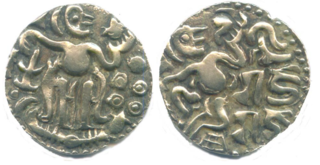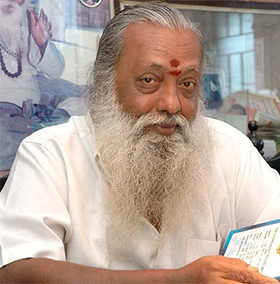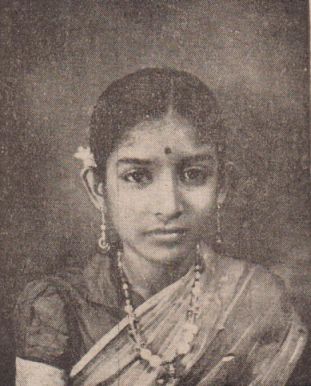
The Satavahanas, also referred to as the Andhras in the Puranas, were an ancient Indian dynasty based in the Deccan region. Most modern scholars believe that the Satavahana rule began in the late second century BCE and lasted until the early third century CE, although some assign the beginning of their rule to as early as the 3rd century BCE based on the Puranas, but uncorroborated by archaeological evidence. The Satavahana kingdom mainly comprised the present-day Andhra Pradesh, Telangana, and Maharashtra. At different times, their rule extended to parts of modern Gujarat, Madhya Pradesh, and Karnataka. The dynasty had different capital cities at different times, including Pratishthana (Paithan) and Amaravati (Dharanikota).

Aditya II, also known as Aditha II or Adithya Karikalan, was a Chola prince who lived in the 10th century in India. He was born in Tirukoilur and was the eldest son of Parantaka Chola II. He was the elder brother of Rajaraja Chola I and Kundavai. He was called Virapandiyan Thalai Konda Koparakesari Varman Karikalan.

Rajendra I, often referred to as Rajendra the Great, Gangaikonda Cholan, and Kadaram Kondan, was a Chola Emperor who reigned from 1014 and 1044 CE. He was born in Thanjavur to Rajaraja I and his queen Vanathi and assumed royal power as co-regent with his father in 1012 until his father died in 1014, when Rajendra ascended to the Chola throne. During his reign, the Chola Empire reached its zenith in the Indian subcontinent; it extended its reach via trade and conquest across the Indian Ocean, making Rajendra one of only a few Indian monarchs who conquered territory beyond South Asia.

Rajadhiraja I was a Chola emperor, as the successor of his father, Rajendra I. He was the only Chola emperor who was killed while leading his army in war, and although he had a short reign, he helped his father conquer several territories as well as to maintain the Chola authority over most of Sri Lanka, Eastern Chalukya and Kalinga, among others. He also established imperial relations with overseas allies despite a series of revolts in the territory.

Balakumaran was an Indian Tamil writer and author of over 200 novels, 100 short stories, and dialogue/screenplay writer for 23 films. He also contributed to Tamil periodicals such as Kalki, Ananda Vikatan and Kumudam. His notable works as a dialogue writer in Tamil Cinema include Nayakan, Guna, Baashha and Pudhupettai.

The Chola dynasty was a Tamil dynasty originating from southern India. At its height, it ruled over the Chola Empire, an expansive maritime empire. The earliest datable references to the Chola are from inscriptions dated to the 3rd century BCE during the reign of Ashoka of the Maurya empire. The Chola empire was at its peak and achieved imperialism under the Medieval Cholas in the mid-9th century CE. As one of the Three Crowned Kings of Tamilakam, along with the Chera and Pandya, the dynasty continued to govern over varying territories until the 13th century CE.
The Chola military was the combined armed forces of the Chola Empire organized during two separate Tamil golden ages, the Sangam Period and the Medieval Era. The Chola military fought dozens of wars, it also underwent numerous changes in structure, organization, equipment and tactics, while conserving a core of lasting Tamil traditions.
Subarayar Vembu, better known by the pseudonym of Vikiraman, was an Indian novelist, short story writer and a journalist who wrote in Tamil. He was also a writer of children's literature.

Sengunthar, also known as the Kaikolar and Senguntha Mudaliar is a caste commonly found in the Indian state of Tamil Nadu, Andhra Pradesh and the neighboring country Sri Lanka. In Andhra Pradesh, they are known as Kaikala or Karikala Bhaktulu, who consider the early Chola emperor Karikala Chola as their hero. They were traditional weavers by occupation and warriors by ancient heritage. They were part of the Chola army as Kaikola regiment and were dominant during the rule of Imperial Cholas, holding commander and minister positions in the court. Ottakoothar, 12th century court poet and minister of Cholas under Vikrama Chola, Kulothunga Chola II, Raja Raja Chola II reign belong to this community. In the olden days in India, the Sengunthars were warriors and were given the title Mudaliar for their bravery. In early thirteenth century, after the fall of Chola empire large number of Kaikolars migrated to Kongu Nadu from Tondaimandalam and started doing weaving as their full time profession as they sworn to be soldiers only for Chola emperors. At present, most of the textile businesses in Tamil Nadu are owned by Senguntha Mudaliars. Majority of Sengunthars are sub-divided into numerous clans based on a patrilineal lineage known as Koottam or Gotra.

Yavana Rani is a Tamil language historical novel written by Sandilyan. The story is based on ancient Tamil poetry. The author of this novel is Sandilyan. It is a love story set around 2000 years ago, focusing on the Commander-in-chief of the Chola Army. The story takes place during the period of Karikala Chola, one of the greatest kings of the Early Cholas.

Pa. Raghavan, a well known Tamil writer, winner of the prestigious ‘Bharathiya Basha Parishad Award’ in 2004. His best known and most appreciated work is Yathi, a Novel, which shows the world of Indian Sanyasis (Monks). His non fictions like Dollar Desam and Nilamellam Raththam are considered to be the milestones in Tamil non-fiction writing.
Tamil historical novels are a genre of Tamil literature that began to appear in the mid-19th century.

S. Abdul Hameed known by his pen name Manushya Puthiran is a poet and writer from Tamil Nadu, India.

Pillavalu Gajapathy Krishnaveni, more famously known as Jikki, was an Indian playback singer from Andhra Pradesh. She sang around 10,000 songs in Telugu, Tamil, Kannada, Malayalam, Sinhalese, and Hindi languages.
S. S. Sivasankar is an Indian politician and writer from the Dravida Munnetra Kazhagam (DMK). He has represented Andimadam (2006–11), and Kunnam constituencies in Tamil Nadu Legislative Assembly. From 7 May 2021 to 29 March 2022, he served as Minister for the Welfare of Backward, Most Backward and Denotified Communities in the Council of Ministers under M.K. Stalin. On 29 March 2022, he assumed charge as the State's Minister for Transport.
Thiripurasundari Srinivasan, better known by her pen name Lakshmi, was an Indian writer from Tamil Nadu.
Narkudi Velalar Varalaru is a book consisting of 1,035 Tamil poems by Arumuga Nayinar Pillai. It was published in 1920 by Sri S. Vala Subramaniya Pillai of Sivakalai. The book narrates the history of the Irungovel family, a branch of Pandya rulers who reigned for 201 generations from 3100 BCE to 1944 AD.

Nanjil Nadan is the pseudonym of G. Subramaniam, a Sahitya academy winning Tamil writer from Tamil Nadu, India.
Vietnam Veedu Sundaram was an Indian playwright, screenwriter and film director. He wrote films such as Gauravam, Vietnam Veedu, Gnana Oli, Satyam, Grihapravesam, Justice Gopinath, Annan Oru Koyil, Naan Yen Pirandhen and Naalai Namadhe. He also directed a few films and is well known for his family themes. He written stories films in languages such as Telugu, Kannada and Hindi. He also worked as an actor in films and television.
M. K. Athmanathan was a music director and lyricist in Tamil cinema. He was honoured by the Tamil Nadu government with the Kalaimamani award in 1978. Her wife named thanlakshmi He has two daughters and one son











